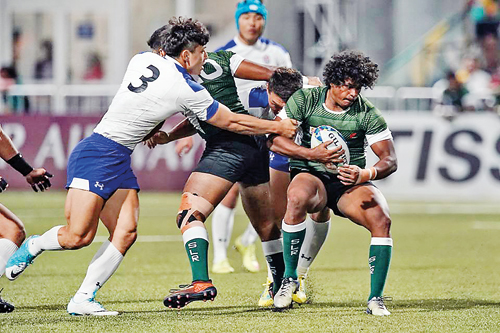We have what it takes, how best to utilise it is lacking
View(s): The hope of winning a medal at the Asian Games 2018 was like seizures of pain stinging the head and minds of Lankans. There was erratic entertainment for a populace saddled with politics to cost of living to protests. We will have to wait another 4 years. It will be another dream like in the past, unless there is a walk of the talk. A dream is entertaining thoughts and sensations entering the mind during sleep.
The hope of winning a medal at the Asian Games 2018 was like seizures of pain stinging the head and minds of Lankans. There was erratic entertainment for a populace saddled with politics to cost of living to protests. We will have to wait another 4 years. It will be another dream like in the past, unless there is a walk of the talk. A dream is entertaining thoughts and sensations entering the mind during sleep.But, when Sri Lanka was ahead of Japan at a time in the quarters, glasses clicked and cheers sung until Japan went ahead just before lemons. A scoreless 2nd half saw Japan through and Sri Lanka forced to think of winning Bronze. That too fell apart as Korea dominated the game, as the Lankans fell apart. Japan, 3 times Gold winners, eventually lost to Hong Kong, inspired by 33-year-old Ben Rimene.
The talk around Rugby is that Sri Lanka was jaded by the tough semi against Japan. Hong Kong, Japan and Korea too had tough games. The difference between the cup and the lip was not being 7s tough. The truth, however, has to be faced. If the showing against Japan is anything to gauge what Sri Lanka is capable of in the 7s format then, what is needed is to build upon that strength. “How” is important while “when and why” has to be looked at when much was spent.
As I turned to sleep, not to dream, I thought of Harvard Business School professor Anita Elberse, who wrote about the leadership methods of Sir Alex Ferguson, one of the greatest Football Managers in the history of the sport, who turned Manchester United into one of the most valuable Clubs. She published in 2013, “Ferguson’s Formula”- a list of Sir Alex’s 8 core concepts, in the Harvard Business Review.
1. Start with the foundation. Sir Alex said his first order of business was to bring in young players and build a youth system that could sustain the club for years, rather than signing veterans for short-gain, but build a Football club right from the bottom. With this approach, the players grow up together, producing a bond that, in turn, created a spirit. Upon his arrival at Manchester in 1986, Ferguson established 2 ‘Centres of Excellence’ for promising players as young as 9, and recruited a number of scouts. The best-known of his early signing was David Beckham.
2. Dare to rebuild your team. As he was not afraid of being fired, he made decisions based on what the team would look like in 4 years. He thought that a team should be retooled every 4 years. We identified 3 levels of players- 30 and older, roughly 23-30, and the younger ones coming in. The idea was that, the younger players were developing and would meet the standards that the older ones had set.
3. Set a high standard — and hold everyone to them. He tells a great anecdote about how meeting high standards can become contagious: “I used to be the first to arrive in the morning. In my later years, a lot of my staff members would already be there when I got in at 7 am. I think they understood why I came in early. They knew there was a job to be done.” Everything done was about maintaining the standards set as a Football club. This applied to all levels of team building and all team preparations, motivational talks, and tactical talks. He never allowed a bad training session. What you see in training manifests itself on the game field. So every training session was about quality.
4. Never, ever cede control. You have to get rid of a player, if he is creating discord and trying to wrest some of your power, even if he is the best player in the world. Do not worry about whether players like you.
5. Match the message to the moment. Ferguson says there is no general rule about when a manager should criticize players and when a manager should encourage players. The context of a situation determines the best message to send to your team. In halftime talks, you have maybe 8 minutes to deliver your message, so it is vital to use the time well. Everything is easier when you are winning. But when you are losing, you have to make an impact. To focus on our own team and our own strengths, but you have to correct why you are losing. You play different roles at different times. Sometimes you have to be a doctor o a teacher o a father.
6. Prepare to win. This is more about risk-taking than anything else. Ferguson’s philosophy is that if you’re down 2-1, you might as well put on an extra offensive player and lose 3-1 rather than play conservatively and lose 2-1, anyway. If we were down at halftime, the message was simple: Don’t panic. Just concentrate on getting the task done
 7. Rely on the power of observation. “As a coach on the field, you don’t see everything,” Ferguson noted. A regular observer, however, can spot changes in training patterns, energy levels and work rates. The key is to delegate the direct supervision to others and trust them to do their jobs, allowing the manager to truly observe. He said, “I don’t think many people fully understand the value of observing. I came to see observation as a critical part of my management skills. The ability to see things is key — or, more specifically, the ability to see things you don’t expect to see.”
7. Rely on the power of observation. “As a coach on the field, you don’t see everything,” Ferguson noted. A regular observer, however, can spot changes in training patterns, energy levels and work rates. The key is to delegate the direct supervision to others and trust them to do their jobs, allowing the manager to truly observe. He said, “I don’t think many people fully understand the value of observing. I came to see observation as a critical part of my management skills. The ability to see things is key — or, more specifically, the ability to see things you don’t expect to see.”
8. Never Stop Adapting. In Ferguson’s quarter of a century at United, the world of Football changed dramatically, from the financial stakes involved to the science behind what makes players better. English Football exploded into a multi-billion dollar business. He was still able to win, regardless of the changing nature of the sport. He explains, “I believe that you control change by accepting it.” Off the field, Ferguson greatly expanded his backroom staff and appointed a team of sports scientists to support the coaches.
Ferguson says, “When I started, there were no agents, and although games were televised, the media did not elevate players to the level of filmstars and constantly look for new stories about them. So they are much more fragile than players were 25 years ago. One of the things I’ve done well over the years is manage change. I believe that you control change by accepting it. That also means having confidence in the people you hire. We had to be successful—there was no other option for me—and I would explore any means of improving. I continued to work hard. I treated every success as my first. My job was to give us the best possible chance of winning. That is what drove me.”‘
Vimal Perera is a former Rugby Referee, Coach and
an Accredited Referees’ Evaluator IRB


